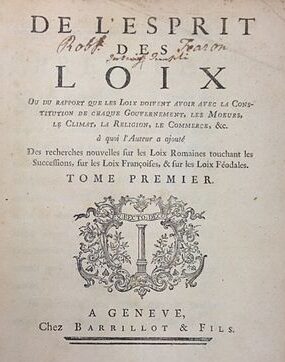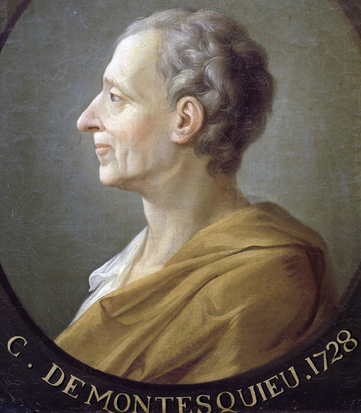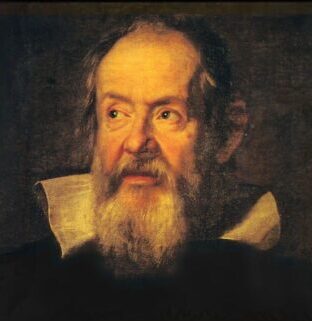Montesquieu: Father of Separation of Powers – The Spirit of Law: Legacy and Influence on Contemporary Politics
イントロダクション
モンテスキューとは、18世紀のフランスの思想家であり、政治哲学者です。
モンテスキューの名前で広く知られていますが、本名は別にあります。
本名はシャルル・ルイ・ド・セコンダといい、ラ・ブレードとモンテスキューという領地の男爵でした。
モンテスキューは、法の支配、三権分立、憲法などに関する重要な理論を提唱したことで有名です。
彼の最も有名な著作は『法の精神』であり、政治のあり方について論じられている著作になります。
モンテスキューの思想は、その後の啓蒙時代や近代政治理論に大きな影響を与えました。
彼の考え方は、日本国憲法やアメリカ合衆国の憲法制定においても重要な影響を与えたとされています。
モンテスキューの功績は、政治学や法学の分野で高く評価されています。
Montesquieu: Father of Separation of Powers – Introduction to the Spirit of Law in Contemporary Politics
Montesquieu was an 18th-century French philosopher and political theorist.
While widely known by the name Montesquieu, his real name was Charles-Louis de Secondat, Baron de La Brède et de Montesquieu.
Montesquieu is famous for advancing critical theories on the rule of law, separation of powers, and constitutional governance.
His most renowned work, “The Spirit of Laws,” discusses the organization of political systems.
Montesquieu’s ideas had a profound impact on the Enlightenment and modern political theory.
His thinking significantly influenced the drafting of the Japanese Constitution and the Constitution of the United States.
Montesquieu’s contributions are highly regarded in the fields of political science and jurisprudence.
シャルル=ルイ・ド・モンテスキューの生涯と背景
モンテスキューは、ブルゴーニュ地方のラ・ブレードで生まれました。
彼の家族は裕福な貴族であり、モンテスキューは幼少期から優れた教育を受けました。
彼はパリの名門校、ルイ・ル・グラン校で学び、法学の基礎を習得しました。
成人後、モンテスキューはブルゴーニュ地方の行政に関与し、地方議会のメンバーとしても活動しました。
彼は行政の実務経験を通じて、政治の内部機能や権力の問題について洞察を深めていきました。
モンテスキューの活動や著作は、18世紀のヨーロッパが経験していた時代背景と深い関連があります。
この時代は啓蒙時代と呼ばれ、理性と科学の重要性が強調され、封建主義や教会の権威に対する批判的な思考が広まりました。
モンテスキューは、この啓蒙思想の影響を受けて政治や社会について新たな見方を提案しました。
彼の思考は絶対君主制や封建制度に対して批判的であり、個人の自由や権利の保護、法の支配の重要性を主張しました。
モンテスキューは1755年にフランスで亡くなりましたが、彼の思想はその後の政治理論や法学の発展に大きな響を与えました。
貴族として誕生したモンテスキュー
当時のフランスの貴族社会は、アンシャン・レジームと呼ばれる、絶対王政の時代であり、フランス革命まで続いた封建主義的な社会体制でした。
貴族は、フランスの社会階層の頂点に位置し、特権的な地位と権力を持っていました。
彼らは生まれながらにして特定の特権や特殊な権利を持ち、政治的、社会的な上位層を形成していました。
貴族は領地や所領を所有し、それによって経済的な豊かさを享受していました。
そのような時代背景の中、爵位を持った貴族として生を受けたモンテスキューは、裕福な家庭で育ち、教育的にも高度なものを受け、母の死により7歳で男爵の地位を継いでいます。
絶対王政を批判する貴族階級出身のモンテスキュー
貴族階級出身のモンテスキューが絶対王政に対して批判的立場に立つ理由はいくつかあります。
まず一つ目として、モンテスキュー自身が貴族階級の出身であったことです。
絶対王政は君主が絶大な権力を持ち、貴族の特権を制限することがありました。
モンテスキューは自身の階級の利益を守るためにも絶対王政への反対を唱えました。
また二つ目として、モンテスキューが古代ローマの共和制を理想的な政治形態と見なしていたことです。
彼は共和制が公共の利益と法の支配を守るための効果的な仕組みであると考え、絶対王政に比べてより自由で公正な政治体制と見なしていました。
さらに三つ目として、啓蒙思想の流行が挙げられます。
啓蒙思想家たちは、理性、自由、平等の原則を重視し、専制的な政治体制に対して批判的でした。
モンテスキューもこの啓蒙思想の影響を受けており、自由な政治体制の必要性を主張しました。
【法の精神】を出版し、政治哲学の歴史に名を刻む
Charles-Louis de Secondat, Baron de Montesquieu: Life and Background
Montesquieu was born in La Brède, Burgundy.
Coming from a wealthy noble family, Montesquieu received an excellent education from a young age.
He studied at the prestigious Louis-le-Grand School in Paris, where he acquired a foundation in law.
As an adult, Montesquieu became involved in Burgundy’s administration and served as a member of the local council.
Through his practical administrative experience, Montesquieu deepened his insights into the functioning of politics and issues of power.
Montesquieu’s activities and writings are deeply intertwined with the historical context of 18th-century Europe.
This period, known as the Enlightenment, emphasized the importance of reason and science and fostered critical thinking against feudalism and the authority of the church.
Influenced by Enlightenment ideas, Montesquieu proposed new perspectives on politics and society.
His thoughts were critical of absolute monarchy and feudalism, advocating for individual freedoms, rights protection, and the rule of law.
Montesquieu passed away in 1755 in France, but his ideas greatly influenced subsequent developments in political theory and jurisprudence.
Montesquieu, Born into Nobility
During Montesquieu’s time, French society was under the Ancien Régime, an era of absolute monarchy that persisted until the French Revolution, characterized by a feudalistic social system.
Nobles occupied the top echelon of French society, enjoying privileged status and power.
By birthright, they held specific privileges and rights, forming the political and social elite.
Nobles owned estates and lands, enjoying economic prosperity as a result.
Born into such a historical backdrop, Montesquieu inherited a baronial title and grew up in a wealthy household, receiving a highly advanced education.
Noble-born Montesquieu’s Critique of Absolute Monarchy
There are several reasons why Montesquieu, born into the noble class, took a critical stance against absolute monarchy.
Firstly, Montesquieu himself was from the noble class.
Absolute monarchy often restricted the privileges of nobles, which prompted Montesquieu to oppose it to protect his own class interests.
Secondly, Montesquieu idealized the ancient Roman Republic as a model political form.
He believed that republicanism provided an effective mechanism to protect public interest and the rule of law, viewing it as more free and just compared to absolute monarchy.
Thirdly, the influence of Enlightenment thought is notable.
Enlightenment thinkers emphasized principles of reason, freedom, and equality, criticizing despotic political systems.
Montesquieu, influenced by these ideas, argued for the necessity of a free political system.
Publishing “The Spirit of Laws,” Montesquieu Cemented His Name in the History of Political Philosophy.

“The Spirit of Laws,”
1748年に出版された【法の精神】は、モンテスキューの主著であり、政治のあり方について詳細に論じられた著書です。
彼は三権分立の理論を提唱し、行政、立法、司法の三権が独立しており、バランスが取られることで権力の乱用を防ぐことができると主張しました。
モンテスキューの思想は、フランス革命や日本国憲法、アメリカ合衆国の憲法制定に大きな影響を与えました。
フランス革命では、モンテスキューの思想が民主主義や法の支配の原則を求める運動に影響を与え、日本国憲法、アメリカ合衆国憲法においても三権分立の原則が採用されました。
彼の著作は今日でも政治学や法学の教育で重要な教材として扱われ、その知識と洞察力は多くの学者や思想家によって称賛されています。
Published in 1748, “The Spirit of Laws” is Montesquieu’s seminal work, extensively discussing the organization of politics.
He advocated for the theory of separation of powers, asserting that the executive, legislative, and judicial branches should operate independently with a balanced system to prevent the abuse of power.
Montesquieu’s ideas greatly influenced events like the French Revolution, the drafting of the Japanese Constitution, and the United States Constitution.
During the French Revolution, his ideas influenced movements seeking democracy and the rule of law principles.
His works continue to be essential educational materials in political science and jurisprudence, praised for their knowledge and insight by many scholars and thinkers today.
モンテスキューの主要業績:【法の精神】の内容と影響
【法の精神】は、モンテスキューの政治哲学的な著作であり、その内容と影響は以下のような特徴を持っています。
1.政治権力の分立と制約:【法の精神】では、モンテスキューは政治権力の分立と制約の重要性を強調しました。
彼は立法権、行政権、司法権の三権が互いに独立していることで、政府の権力の乱用を防ぐことができると主張しました。
この考え方は後の政治学や憲法制度の発展に大きな影響を与えました。
特に日本国憲法やアメリカ合衆国の憲法制定において、三権分立の原則が取り入れられるきっかけとなりました。
2.法の相対性と普遍性:モンテスキューは【法の精神】において、法は人間の文化や環境によって相対的に変化するものでありながらも、普遍的な原理に基づいていると主張しました。
彼は法の制定や適用において、地域の習慣や風俗、気候などの要素を考慮する必要がある一方で、普遍的な正義や理性に基づいた原則を守ることも重要だと述べました。
この考え方は法の相対性と普遍性の問題についての議論を刺激し、法学の発展に影響を与えました。
3.気候と政治体制の関連性:【法の精神】では、モンテスキューは気候や地理的条件が政治体制や社会の形成に与える影響についても論じました。
彼は気候や地理的要素が人々の性格や習慣に影響を与え、それが政治体制や法律の形成にも関わると主張しました。
この考え方は社会学や政治学において地理的要素の重要性を強調する先駆的なものであり、後の研究に影響を与えました。
当時としては超ベストセラー&超ロングセラーだった【法の精神】
【法の精神】は当時の出版界で非常に成功した作品であり、ベストセラーとなりました。
出版後間もなく広く読まれ、多くの議論を巻き起こしました。
その後も長期間にわたって読み継がれ、影響力を保ち続けました。
【法の精神】の成功の理由はいくつか考えられます。
まず、当時の政治的状況や社会の関心事に対して深い洞察を提供していた点が挙げられます。
モンテスキューは、専制政治への批判や政治権力の分立と制約の必要性といった重要なテーマを取り上げ、それに対する新たな視点を提示しました。
また、彼の文章スタイルと論理的な展開も注目されました。
彼は鮮明な思考と明快な表現で政治理論を説明し、読者にとって理解しやすい形で提示しました。
このクリアで魅力的なスタイルが、多くの読者に訴えかけ、彼の思想を広く受け入れられる要因となりました。
さらに、【法の精神】は当時の啓蒙思想の流れに沿っており、その思想が広く受け入れられる社会的な環境が整っていました。
モンテスキューの著作はこのような時代の要請に応え、多くの読者に支持されたのです。
【法の精神】の成功と影響力は、それが時代のニーズに合致し、魅力的な思想と鮮明な表現で読者に訴えかけたことによるものと言えます。
モンテスキューの社会政治哲学は現代に通じるもの
モンテスキューの社会政治哲学は現代においても通用する要素を持っています。
三権分立の原則や共和制の理念、法の普遍性と相対性、自由と個人の権利保護等、現代の政治や社会においても根本的な問題や価値観を提起し、重要な影響を与え続け、現代の政治体制や法の発展に貢献しています。
Montesquieu’s Major Achievements: Content and Influence of “The Spirit of Laws”
“The Spirit of Laws,” published in 1748, stands as Montesquieu’s seminal work in political philosophy, characterized by its detailed examination and profound impact in the following aspects:
- Separation and Checks of Political Powers: In “The Spirit of Laws,” Montesquieu emphasized the importance of separating and constraining political powers. He argued that by ensuring the independence of the legislative, executive, and judicial branches, governmental abuse of power could be prevented. This concept significantly influenced the development of political science and constitutional systems, notably contributing to the adoption of the principle of separation of powers in the drafting of the Japanese Constitution and the United States Constitution.
- Relativity and Universality of Law: Montesquieu asserted in “The Spirit of Laws” that laws are relative to human culture and environment but are grounded in universal principles. He advocated for considering regional customs and climates in the formulation and application of laws, while upholding principles based on universal justice and reason. This perspective stimulated discussions on the relativity and universality of law, profoundly influencing the development of jurisprudence.
- Climate and Political Systems: Montesquieu also discussed in “The Spirit of Laws” how climate and geographical conditions influence the formation of political systems and societal norms. He argued that these factors shape people’s characters and habits, thereby affecting the formation of political systems and laws. This pioneering view underscored the importance of geographical elements in sociology and political science, influencing subsequent research.
“The Spirit of Laws” was a bestseller and enduring success in the publishing world of its time. It garnered widespread readership shortly after publication, sparking numerous debates. Its enduring influence can be attributed to several factors: Montesquieu’s profound insights into contemporary political situations and societal concerns, his clear and logical writing style that made political theory accessible, and its alignment with the Enlightenment ideals prevalent at the time.
Moreover, “The Spirit of Laws” resonated with the intellectual currents of the Enlightenment, finding broad acceptance in society. Montesquieu’s work responded to the demands of its era, appealing to a wide readership with its compelling ideas and clear expression.
The success and influence of “The Spirit of Laws” stemmed from its ability to meet the needs of its time, presenting appealing ideas with clarity and depth. Montesquieu’s socio-political philosophy continues to resonate in modern times, addressing fundamental issues and values in contemporary politics and society. His principles of separation of powers, republican ideals, the universality and relativity of law, and protection of individual freedoms and rights remain relevant, contributing significantly to the development of modern political systems and law.
モンテスキューの思想とその影響力
モンテスキューの思想は、その時代の政治的状況や社会の問題に対する洞察として重要であり、現代の政治学や社会科学の基盤となっています。
彼の思想は啓蒙思想であり、政治の分散と制約、法の普遍性と相対性、市民の自由と権利の保護などの概念を通じて、現代の政治体制や法の発展に大きな影響を与え続けています。
権力分立の理念とその後の政治制度への影響
モンテスキューは、政治制度は法によって支配されるべきであり、法は国民の自由と幸福を保障するものであると考えました。
そのため、彼は、権力分立の原理を唱えました。
権力分立とは、立法権、行政権、司法権の三つの権力を相互に牽制し合うようにすることで、権力の乱用を防ぐことです。
この思想は、先にも述べたとおり、フランス革命や日本、アメリカ等の憲法制定にも大きな影響を与えています。
啓蒙思想家としてのモンテスキューの立ち位置
モンテスキューの立ち位置は、啓蒙思想家の中でも独自のものであったと言えます。
彼は、理性や自然法に基づく普遍的な価値観を否定はしませんでしたが、同時に、それらが絶対的なものではなく、時代や場所や状況に応じて変化するものであることを認めていました。
また、自由や平等や人権といった啓蒙思想の基本的な理念を支持しながらも、それらを実現する方法や形態は一つではなく、多様であるべきだと考えました。
彼は、啓蒙思想家としての批判的な精神と、歴史家や社会学者としての客観的な視野を併せ持つことで、啓蒙思想の新しい可能性を開拓したと言えます。
Montesquieu’s Philosophy and Its Influence
Montesquieu’s philosophy stands as a crucial insight into the political and social issues of his time, laying the groundwork for modern political science and social sciences. Rooted in Enlightenment ideals, his concepts such as political decentralization, checks and balances of power, the relativity and universality of law, and the protection of civil liberties and rights continue to profoundly impact the development of contemporary political systems and law.
The Concept of Separation of Powers and Its Impact on Subsequent Political Systems
Montesquieu argued that political systems should be governed by laws that guarantee the freedom and happiness of citizens. Thus, he advocated for the principle of separation of powers. This principle entails balancing the legislative, executive, and judicial branches of government against each other to prevent the abuse of power. As mentioned earlier, this idea has greatly influenced constitutional developments in events such as the French Revolution, and the constitutions of Japan and the United States.
Montesquieu’s Position as an Enlightenment Thinker
Montesquieu’s position among Enlightenment thinkers was distinctive in its own right. While he did not reject universal values based on reason and natural law, he acknowledged their relative nature, subject to change depending on time, place, and circumstance. While supporting fundamental Enlightenment principles such as liberty, equality, and human rights, he believed that the methods and forms to achieve these ideals should be diverse rather than singular. His critical spirit as an Enlightenment thinker, combined with his objective perspective as a historian and sociologist, pioneered new possibilities within Enlightenment thought.
These aspects of Montesquieu’s philosophy continue to resonate in contemporary debates on governance, law, and individual rights, highlighting his enduring influence on modern political and social thought.
モンテスキューが残した遺産と現代への意義
モンテスキューの遺産は、彼の著作と思想が現代の政治理論、法学、社会科学の基礎となり、政治体制や法制度の発展に大きな影響を与えたことにあります。
彼の思想は、個人の自由と権利、政治権力の制約、法の普遍性と相対性などの概念を通じて、現代の社会政治の基盤となっています。
現代政治におけるモンテスキューの思想の役割
モンテスキューの思想が現代政治においてどのような役割を果たしているかというと、まずは三権分立の原則に関しての役割です。
現代の民主主義国家の政治システムの基礎となっており、立法権、行政権、司法権の分立は、権力の乱用を防ぎ、政府の権限を制約する重要な原則です。
現代の憲法制度や法の体系は、モンテスキューの思想に基づいて三権分立を取り入れています。
続いて、個人の権利と自由の保護の重要性についてです。
現代の政治においても、個人の権利と自由の保護は重要なテーマです。
法の下での平等な扱い、表現の自由、信教の自由、プライバシーの保護など、個人の権利と自由を守るための法的な枠組みが確立されています。
さらには、宗教的寛容性と社会的な多様性を重視した部分です。
現代の政治においても、異なる宗教や信念、文化、人種の多様性を尊重する社会的な寛容性と多元主義が求められています。これは公平な社会の構築や人権の保護に関連しています。
モンテスキューの業績が教える民主主義の本質
モンテスキューの業績から学ぶことは、民主主義の本質は政治権力の制約と分散、法の支配と平等の原則、市民の参加と責任、寛容と多元主義に基づいているということです。
これらの要素が民主主義の基盤となり、自由や正義、公共の利益を追求する政治体制を形成する上で重要な役割を果たしています。
Montesquieu’s Legacy and Its Significance for the Modern Era
Montesquieu’s legacy lies in how his writings and ideas have become foundational to contemporary political theory, jurisprudence, and social sciences, significantly influencing the development of political systems and legal frameworks.
His philosophy, encompassing concepts like individual freedoms and rights, checks on political power, and the relativity and universality of law, forms the bedrock of modern socio-political thought.
The Role of Montesquieu’s Ideas in Contemporary Politics
In contemporary politics, Montesquieu’s ideas play a crucial role, particularly in the principle of separation of powers. This principle underpins the political systems of modern democratic nations, ensuring that the legislative, executive, and judicial branches check and balance each other, thereby preventing the abuse of power and constraining governmental authority. Modern constitutional systems and legal frameworks incorporate Montesquieu’s thought by adopting principles of separation of powers.
Furthermore, his emphasis on the protection of individual rights and freedoms remains pivotal in modern political discourse. Legal frameworks today ensure equality under the law, freedom of expression, religious freedom, and privacy protections, safeguarding individual liberties.
Additionally, Montesquieu’s advocacy for religious tolerance and societal diversity is pertinent in contemporary politics, where respect for diverse religions, beliefs, cultures, and races fosters social tolerance and pluralism. These values are essential for constructing fair societies and protecting human rights.
Lessons on Democracy from Montesquieu’s Achievements
Montesquieu’s achievements teach us that the essence of democracy lies in restraining and dispersing political power, the rule of law and principles of equality, citizen participation and accountability, as well as tolerance and pluralism. These elements form the foundation of democracy, shaping political systems that pursue freedom, justice, and the public good.
Montesquieu’s insights continue to illuminate the path towards democratic governance, guiding modern societies in their pursuit of equitable and just political structures.
まとめ:シャルル=ルイ・ド・モンテスキューの業績とその意義
モンテスキューの業績と意義を以下のようにまとめてみました。
・モンテスキューは三権分立の理論を提唱し、行政、立法、司法の独立性を主張した。
・彼は法の支配の重要性を強調し、法が権力の乱用から人々を守る役割を果たすべきだ と主張した。
・政治的な自由と個人の権利の保護を重視し、専制的な政府から市民を守る必要性を指 摘した。
・彼は気候と政治制度の関係についても研究し、気候が国の政治的な特徴や人々の性格 に影響を与えると主張した。
・彼の業績は民主主義や法治国家の基盤となり、フランス革命や他の国々の憲法制定に 影響を与えた。
また、モンテスキューの思想は現代の政治理論や法学の発展にも大きな影響を与え、その考え方は今日でも広く研究されています。以上がモンテスキューのまとめとなります。
Summary: Charles-Louis de Secondat, Baron de La Brède et de Montesquieu’s Achievements and Their Significance
Here’s a summary of Montesquieu’s achievements and their significance:
- Montesquieu advocated for the theory of separation of powers, asserting the independence of the executive, legislative, and judicial branches.
- He emphasized the importance of the rule of law, arguing that laws should protect people from the abuse of power.
- Montesquieu underscored the protection of political freedoms and individual rights, highlighting the necessity to safeguard citizens from despotic governments.
- He also researched the relationship between climate and political systems, suggesting that climate influences a nation’s political characteristics and people’s dispositions.
- His contributions laid the groundwork for democracies and rule of law states, influencing the drafting of constitutions during the French Revolution and in other countries.
Furthermore, Montesquieu’s ideas continue to profoundly impact the development of modern political theory and jurisprudence, remaining subjects of extensive study to this day. This concludes the summary of Montesquieu’s contributions.



コメント